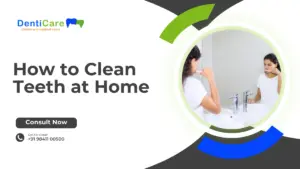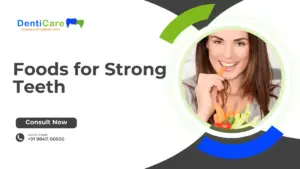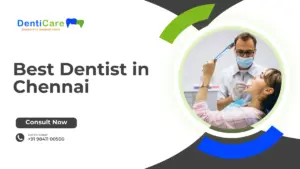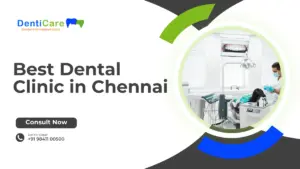Maintaining oral hygiene goes beyond brushing twice a day it’s about adopting consistent, smart habits that protect your teeth and gums. How to clean teeth at home means removing plaque, trapped food particles, and surface stains that can cause cavities, gum infections, and bad breath. While professional care at Denticare Dental and Implant Clinic is essential, effective home routines help you enjoy a healthy, radiant smile every day.
Why Do Teeth Turn Yellow?
- Food and Drink Stains: Coffee, tea, red wine, and pigmented foods gradually discolor enamel. Many people look for tips on how to clean yellow teeth at home without harsh chemicals.
- Poor Oral Hygiene: Skipping brushing or flossing allows tartar buildup, dulling your smile. Learning how to clean teeth at home with baking soda can prevent this issue.
- Smoking and Tobacco Use: Nicotine and tar cause persistent stains. Smokers often explore how to clean teeth at home naturally with remedies like oil pulling or activated charcoal.
- Aging: Over time, enamel thins and dentin shows through, making teeth appear yellow. Proper home care and professional whitening help manage this.
- Medications and Health Issues: Antibiotics or excess fluoride may cause deep stains. These require expert treatment at Denticare Dental and Implant Clinic.
Safe Ways to Clean Teeth at Home
- Baking Soda Paste: Use once a week for surface stain removal. A reliable method of how to clean teeth at home with baking soda safely.
- Oil Pulling with Coconut Oil: Swish for 10–15 minutes daily to reduce bacteria and freshen breath.
- Crunchy Fruits & Vegetables: Apples, carrots, and celery naturally scrub teeth as you chew.
- Activated Charcoal: Use occasionally to absorb toxins and stains a natural approach to how to clean teeth at home naturally.
- Diluted Hydrogen Peroxide Rinse: Can brighten teeth when used sparingly.
At-Home Care Tips for Brighter Teeth
- Brush twice daily with fluoride toothpaste.
- Hold your brush at a 45° angle using circular motions.
- Floss once a day to remove hidden debris.
- Replace your toothbrush every 3 months.
- Use baking soda with lemon juice occasionally, but avoid frequent use.
Whitening Methods to Avoid
Lemon juice alone
Lemon and other citrus juices are highly acidic (they contain citric acid). The acid softens and dissolves the mineral layer of your teeth (enamel). At first you might see a little “brightening,” but repeated acid exposure erodes enamel, exposing the yellowish dentin underneath which actually makes teeth look more yellow in the long run. Acid erosion also increases sensitivity and speeds up decay.
Safer alternative: Rinse with water after acidic foods or drinks and use fluoride toothpaste to help remineralize enamel. If you want whitening, talk to your dentist about supervised whitening rather than using lemon directly.
Undiluted hydrogen peroxide
Hydrogen peroxide is a bleaching agent, but at high concentrations it can burn gums, irritate the mouth lining, and inflame soft tissues. Strong or undiluted solutions can also weaken enamel and greatly increase tooth sensitivity. Overuse may damage the pulp (the nerve) in severe cases.
Safer alternative: Only use peroxide-based products at concentrations and durations recommended by a dental professional. In-office whitening or dentist-prescribed home trays use controlled concentrations and protective protocols to avoid injury.
Whitening chewing gums
Whitening gums are mostly breath-freshening products. They may contain mild abrasives or enzymes, but they do not penetrate stains deeply and rarely produce meaningful whitening. Some contain sugar or acidic flavorings that can harm teeth if chewed frequently. Expect fresh breath not significant whitening.
Safer alternative: Use sugar-free gum (xylitol) for saliva stimulation after meals, and rely on toothpaste and professional treatments for whitening.
Overusing abrasive powders (e.g., charcoal, coarse baking soda)
Abrasive powders physically scrub stains, but daily or aggressive use wears away enamel. Once enamel is thinned or pitted, stains can set more easily and sensitivity increases. Some powders (like activated charcoal) may also interfere with fluoride uptake or leave microabrasions that trap stain pigments.
Safer alternative: If you want occasional polishing, use a low-abrasion product recommended by your dentist (check the RDA value). Limit abrasive treatments to occasional use only.
Whitening toothpastes with no active ingredients
Many toothpastes labelled “whitening” rely on mild polishers or optical brighteners and cannot remove deep (intrinsic) stains. If the product lacks peroxide or a clinically proven whitening agent, results will be minimal and temporary. You may waste time and delay effective treatment.
Safer alternative: Choose toothpastes with proven active ingredients or the ADA/your country’s dental association seal. For stubborn stains, professional in-office whitening or dentist-supervised home kits are more reliable.
Bottom line
Home remedies can help with surface stains if used carefully, but acids, undiluted bleaches, and heavy abrasives carry real risks. Before trying a whitening hack, ask your dentist which methods are safe for your teeth and gums. A quick in-clinic check can prevent irreversible enamel damage and get you a whitening plan that’s both effective and safe.
Preventing Tooth Stains
- Brush twice daily and rinse after meals.
- Limit coffee, tea, and colored drinks (use a straw when possible).
- Quit smoking and avoid tobacco.
- Eat stain-resistant foods like crunchy veggies and dairy.
- Visit Denticare Dental and Implant Clinic for professional cleanings.
Types of Tooth Stains
Extrinsic Stains
- Found on the outer surface of teeth.
- Caused by tea, coffee, wine, or tobacco.
- Easier
Intrinsic Stains
- Develop within the tooth structure.
- Often due to trauma, aging, fluoride, or certain medications.
- Harde
Why Professional Cleaning Still Matters
Even with the best tips on how to clean teeth whitening at home, plaque and tartar need professional attention. At Denticare Dental and Implant Clinic, skilled dentists use advanced tools like ultrasonic scalers and polishing techniques for long-lasting results. Regular checkups also help detect cavities, gum disease, or enamel erosion early.
Conclusion
Understanding how to clean teeth at home empowers you to care for your smile every day. From baking soda to oil pulling, there are many safe, natural methods to try. But for stubborn stains and long-term oral health, expert care is essential. Visiting Denticare Dental and Implant Clinic in Chennai ensures brighter teeth, preventive care, and a confident smile for life.




